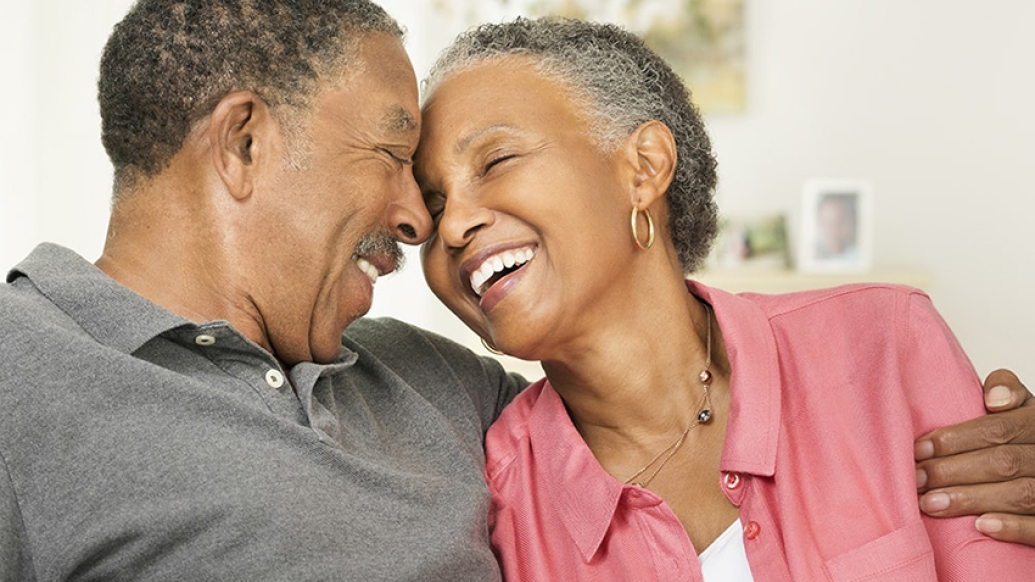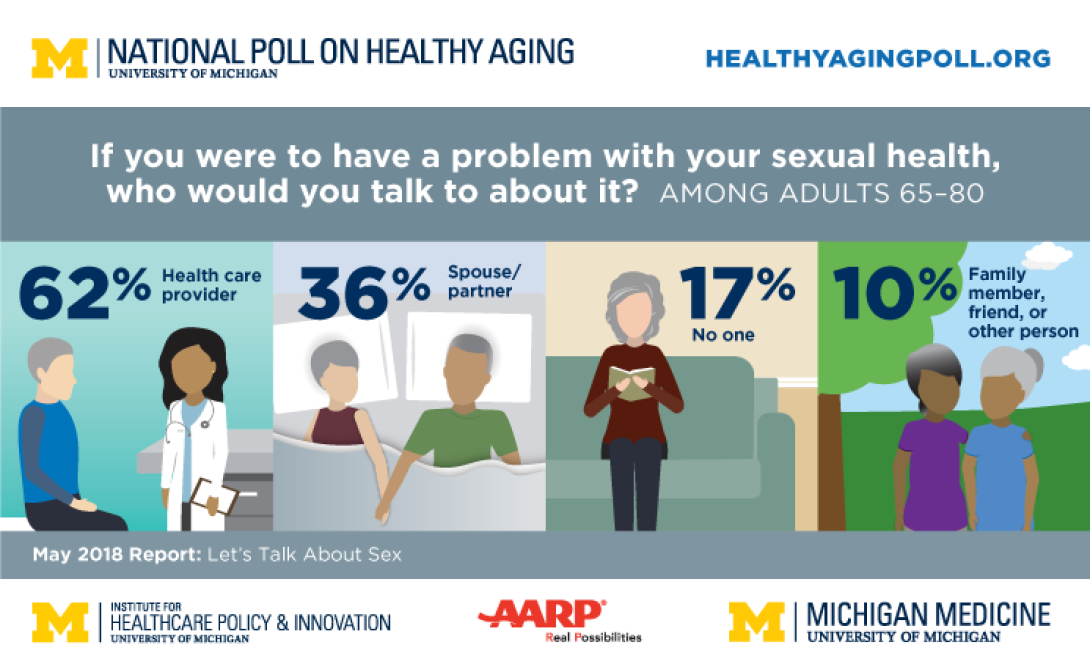Most older Americans are satisfied with their sex lives, but frequency varies by age, health and other factors. And not many consult their doctors about sex-related problems.
7:00 AM
Author |

A new poll challenges myths about the sex lives of older Americans — and it reveals gender- and health-related divides on key aspects of sexual health while highlighting the need for more people to talk with their health providers about sexual issues.
MORE FROM THE LAB: Subscribe to our weekly newsletter
Forty percent of people ages 65 to 80 are sexually active, according to new findings from the National Poll on Healthy Aging. Nearly three-quarters of people in this age range have a romantic partner; 54 percent of those with a partner are sexually active.
Whether or not they have an active sex life, nearly two-thirds of older adults say they're interested in sex. More than half say sex is important to their quality of life.
And when asked if they're satisfied with their current sex life, 73 percent of the nationally representative sample of 1,002 people polled said they were. The poll was conducted by the University of Michigan Institute for Healthcare Policy and Innovation and sponsored by AARP and Michigan Medicine, U-M's academic medical center.
The poll explored how older adults might seek help or advice for sexual problems and whether they've talked with their doctors about their sexual health.
Eighteen percent of older men and 3 percent of older women say they've taken medications or supplements to improve sexual function in the past two years. But only 17 percent of older adults said they have talked with their doctor or other health care provider about sexual health in the past two years. Most who had engaged in such discussions said they brought the topic up, suggesting the need for more proactive conversations by clinicians with their older patients.
"Sexual health among older adults doesn't get much attention but is linked closely to quality of life, health and well-being," says U-M's Erica Solway, Ph.D., co-associate director of the poll. "It's important for older adults and the clinicians who care for them to talk about these issues and about how age-related changes in physical health, relationships, lifestyles and responsibilities such as caregiving affect them."
It's important for older adults and the clinicians who care for them to talk about these issues and about how age-related changes in physical health, relationships, lifestyles and responsibilities such as caregiving affect them.Erica Solway, Ph.D.
Desires and divides
A patient's age and health status are often linked to sex, Solway notes.
Compared with the 45 percent of respondents with excellent, very good, or good health who reported they were sexually active, only 22 percent of those who said they are in fair or poor health were sexually active. Only 28 percent of those with fair or poor health said they were extremely or very satisfied with their sex lives.
SEE ALSO: How the Sex Talk Differs for Young Adults with Cancer
Those between the ages of 65 and 70 were nearly twice as likely as those in their late 70s to be sexually active. One-third of those in their late 60s said they were extremely or very interested in sex, compared with 19 percent of those in their late 70s.
The gender gaps that emerged also reveal some differences that may create challenges. Women, the poll found, were less likely than men to be sexually active — 31 percent overall, compared with 51 percent of men — but were more likely to be extremely or very satisfied with their sex lives. And while 84 percent of older men said sex was an important part of a romantic relationship, only 69 percent of older women agreed with that statement.
But the biggest gender difference was the percentage of those who said they were extremely or very interested in sex. Half of men aged 65 to 80 said they had this level of interest, compared with just 12 percent of women in the same age range.
"This survey just confirms that the need for and interest in sexual intimacy doesn't stop at a certain age," says Alison Bryant, Ph.D., senior vice president of research for AARP. "Although most older adults say that they would talk with their doctor about sexual concerns, health care providers should routinely be asking all of their older patients about their sexual health and not assume that bringing up the issue will offend or embarrass them."

Dialogue is key
A key takeaway from the poll, Solway notes, is that there appears to be opportunity for more proactive conversations between providers and their older patients about sexual health.
In all, 62 percent of the older adults polled said that if they were having a problem with their sexual health, they would talk with their health provider about it, yet only 17 percent had actually done so in the past two years. The majority (88 percent) of those who had talked with their provider about their sexual health said they were comfortable doing so.
The poll results are based on answers from a nationally representative sample of 1,002 people ages 65 to 80. The poll respondents answered a wide range of questions online. Questions were written, and data interpreted and compiled, by the Institute for Healthcare Policy and Innovation team. Laptops and internet access were provided to poll respondents who did not already have it.
A full report of the findings and methodology is available at www.healthyagingpoll.org along with past National Poll on Healthy Aging reports.

Explore a variety of health care news & stories by visiting the Health Lab home page for more articles.

Department of Communication at Michigan Medicine
Want top health & research news weekly? Sign up for Health Lab’s newsletters today!





